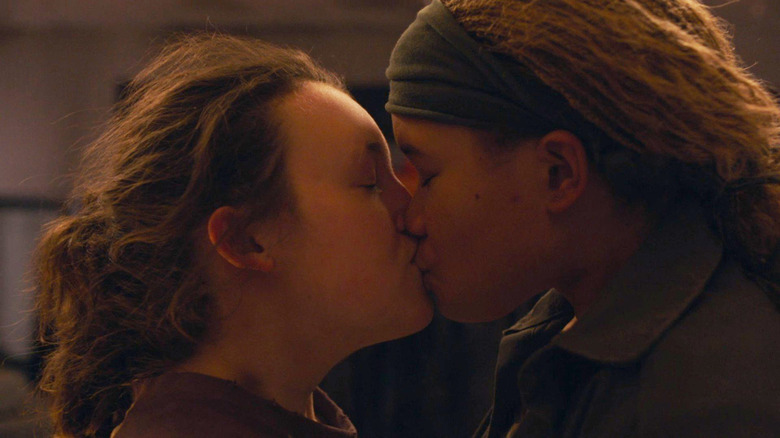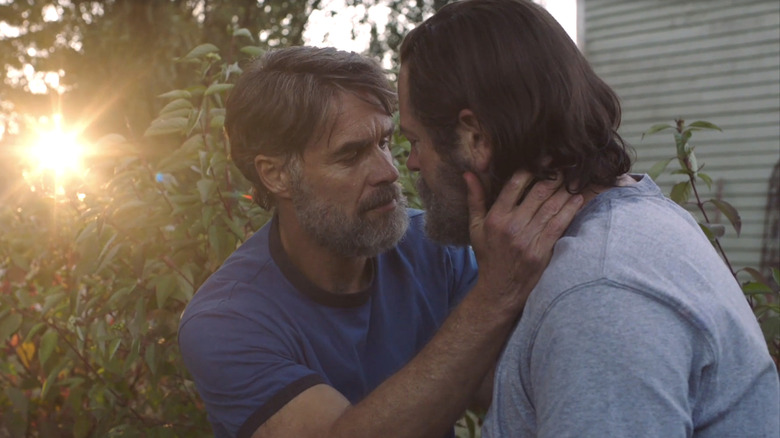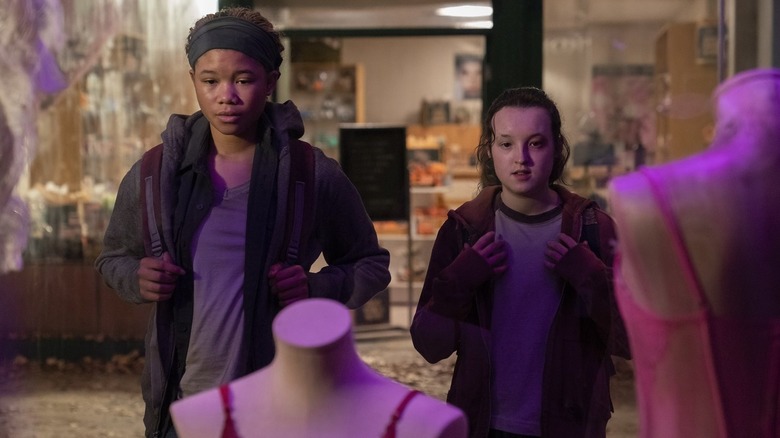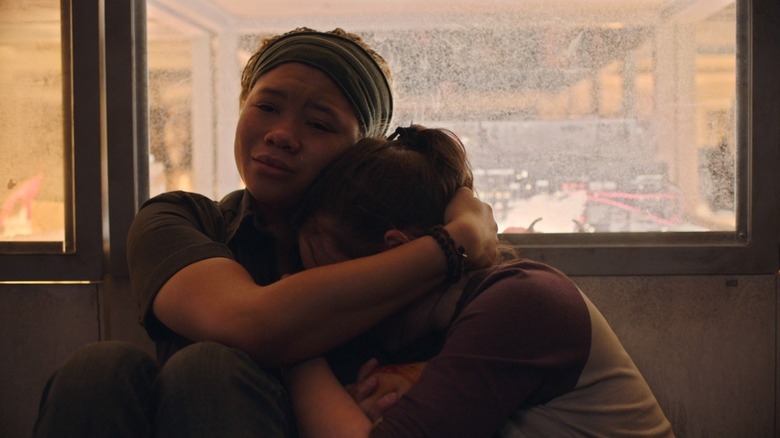The Last Of Us Doesn't Force Perfection On LGBTQ+ Characters
This article contains spoilers for "The Last of Us" on HBO as well as the video game source material.
A line in "28 Days Later" has kept me up at night for the better part of two decades. It's when Major Henry West tells Jim, "women mean a future." In most apocalyptic stories, cis women become a form of currency, with the ability to conceive and bear children viewed as the ultimate valuable commodity. In times of great unrest, value is dictated by whatever has the highest probability of determining a future. In HBO's "The Last of Us," Ellie (Bella Ramsey) is worth more than anything or anyone. It's not because of her ability to have children nor was it written as some otherworldly prophecy that Ellie must stay alive — it's the coincidence that she was born with natural immunity to the cordyceps fungus that could be the key to a cure.
The most valuable person in the world of "The Last of Us" is a mouthy, impolite, curious, queer teenage girl.
Queerness isn't just a cute addition to "The Last of Us," it's the central conceit of the entire show. If Ellie dies, hope for a cured future no longer exists. It would be very, very easy for a character like Ellie to fall into the trope of being a "naïve everygirl" or the dreaded "Mary Sue," but Ellie is the furthest thing from an idealized archetype. Instead, Ellie is a messy, complicated, imperfect protagonist, and avoids the current trend of overcorrecting years of piss-poor queer stereotypes passed off as "representation" by being put on an unrealistic pedestal. And it's not just Ellie — "The Last of Us" allows all of its queer characters to be fully realized, three-dimensional human beings.
The Ballad of Bill and Frank
Episode 3 of the first season of "The Last of Us" took the barely touched-upon story of Bill and Frank established in the game and turned it into 75 minutes of absolutely breathtaking queer storytelling. The unlikely love story between the bitter, paranoid Bill (Nick Offerman) and the heartwarming, sensitive Frank (Murray Bartlett) was unexpected not just because it diverted from the source material, but because the duo doesn't fulfill the typical clichés reserved for queer love stories.
Their introduction is not some meet-cute in an upscale coffee shop in Manhattan, nor is it some adorable coincidence that they happen to be the only out characters at their high school. Rather, Bill and Frank are fully grown men in the midst of the world falling to pieces, and their introduction takes place while Bill has Frank captured at gunpoint. Talk about finding love in a hopeless place, amirite?
As the years go by, Bill and Frank's relationship is not portrayed as perfect. They argue, loudly in the middle of the streets, and they have plenty of disagreements. There's an honesty that queer characters have been denied in recent years, fearful that by letting our oppressors know that our relationships aren't always sunshine and rainbows, they'll continue stripping us of what little rights we do have. By showing not only Bill and Frank's longevity as a couple but the frequent moments of hardship they experience beyond just the whole "fungus zombie apocalypse," they shatter the "perfect relationship" expectation queer characters in mainstream media are often saddled with portraying. They're allowed to be in love in a way that is not without its own growing pains, which also helps model a more realistic example for queer folks who seldom see their own relationships reflected on screen.
Take on me, Ellie and Riley
"The Last Of Us" episode 7 adapts the downloadable content "The Last of Us: Left Behind," which introduces us to Ellie's best friend Riley (Storm Reid), and gives us a bit of backstory on Ellie's life before she ended up in the care of Joel (Pedro Pascal). Riley's identity is somewhat speculative in the game, but with lines like "We can be all poetic and s*** and lose our minds together," after the two are bitten, it's pretty canonical that Riley has genuine feelings for Ellie. This relationship is pivotal for Ellie, who realizes her own queerness by recognizing her feelings for her best friend.
During Ellie and Riley's night at the mall, they're sneaking around, breaking into buildings, drinking booze, and in the case of Riley, potentially training to be a terrorist (it depends on how you view the Fireflies). As they pass by a lingerie display in the mall, Ellie is confused why anyone would wear a thong considering it looks uncomfortable. Riley laughs to herself and admits she was just imagining Ellie wearing it.
It's a small moment, but it's also an acknowledgment of blatant sexuality for queer teenagers. There's an innumerable number of sex comedies centered on straight teens hoping to lose their virginities before graduation, while in states like Florida, school districts are banning children's books about male penguins raising a baby penguin together. Riley isn't forced to be a pure, desireless being radiating nothing but feelings of love, she's a young girl experiencing sexual tension. Even in the apocalypse without any entertainment, social media, or outside influence, Ellie and Riley still wound up queer ... because it's who they are.
There's no such thing as a perfect survivor
The entertainment biz has a nasty habit of presenting queer characters as borderline Christ-like figures of goodness, a means to humanize us to a hostile world that debates whether or not we should even exist. And so, it is refreshing that "The Last of Us" not only declares queer characters as some of the most pivotal to the story but allows them to maintain their value without having to become some weird avatars for innocence and purity. Any sadness or pity we feel for these characters is not because of their queerness, but because they're human beings enduring unspeakable circumstances. Whether she's reading diarrhea puns or smashing up glass display cases, Ellie's emotions are always validated by the show.
Unfortunately, the same can not be said for the Black characters on the show, and as beautiful as the retconning of Bill and Frank's story was, it also changes how their deaths will impact Ellie moving forward. We won't know until season 2 specifically how this will all play out but given the explicit queerness presented in "The Last of Us Part II," it's safe to assume that the HBO series will only be getting gayer and even messier. We're currently living through so-called "unprecedented times," and considering the ongoing legislative assault against the LGBTQIA+ community, namely transgender people, I understand why so many people are afraid of allowing queer characters to be sloppy, messy, or frankly, human.
But "The Last of Us" doesn't take place during unprecedented times, it takes place during the end times. Here's hoping we don't need a zombie outbreak in real life to make people realize a queer person existing imperfectly is a non-issue.



